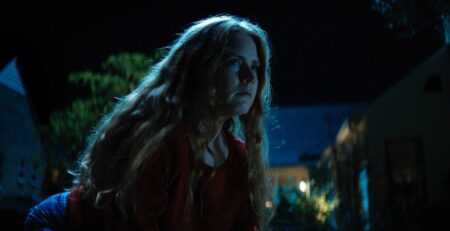It’s argued that all film is political. Nothing is made in a vacuum, and despite how silly or escapist a movie becomes, its existence is, in one way or another, a response to the circumstances that bore it. Unlike other films, The Seed of the Sacred Fig is not attempting to mask its aspirations. It’s a fiery, unabashedly political piece of filmmaking so critical of the Iranian regime, director Mohammad Rasoulof has been living in exile in Germany (which officially submitted the film for the international feature race) since its Cannes premiere. Yet, as admirable as The Seed of the Sacred Fig is, heavy-handed messaging and a clunky third act keep it from greatness.
The story, penned by Rasoulof, follows a nuclear family slowly being destroyed from the inside out by the regime’s stringent rules. After the patriarch, Imam (Misagh Zare), is promoted to state investigator— a springboard to becoming an affluent court judge—his family must behave as models of the Iranian Government. His wife, Najmeh (Soheila Golestani), and two adolescent daughters, Rezvan (Mahsa Rostami) and Sana (Setareh Maleki), must come to heel by properly wearing their Hijabs and avoiding any criticism of the state.
Yet, when protests explode on the streets, and activists are met with violent, brutal repression by Iranian authorities, it becomes difficult for Imam’s daughters to stay silent. Especially when their father plays a direct role in perpetrating such atrocities—signing off on death-penalty judgments against hundreds of activists without due process. As Imam becomes more immersed in his work, division grows amongst his family. He then takes matters into his own hands to root out dissent.
Shot with crisp confidence, Rasoulof does a deft job of painting the moral, ethical, and ideological battles being waged inside each character’s mind. Stark close-ups of Imam’s face, vividly realized by Zare, entrench us in a life full of personal concessions, where a sense of self-worth is willingly surrendered to a higher power for a social cachet.
Rasoulof’s lens evokes such realities with purposeful framing, resting on the strained, detached visage of a man whose career not only endangers his life but forces him to drift further and further away from his family. During many moments, The Seed of the Sacred Fig unfolds as a distant cousin to 70s paranoid cinema. This harrowing thriller taps into the zeitgeist of its nation with tenacity and verve.

In search of a paradise in hell, Imam’s wife also feels she must keep her daughters in line to ensure her husband is promoted to Judge and her family can be moved into secure state housing—even if it means using dangerous interrogation methods. Yet, it’s a mindset that is hard to maintain as her daughters slowly begin to vocalize their support of the protests below their Tehran apartment. Rostami and Maleki shine in these sequences, brimming with conviction, outrage, and quiet fear, as women who understand their sense of agency are at risk in their household.
At the same time, Rasoulof never creates a villain out of regime-supporting characters but views them all as sorry victims of a police state. Constant self-surveillance becomes the government’s principal weapon, more potent than any nuclear missile. The Seed of the Sacred Fig skillfully illuminates how oppressive systems are only as strong as their followers, who are taught to endear themselves to the authority figure as a means to both rise in the social order and merely survive.
The message is further animated with actual footage of the “Women, Life, Freedom” movement that erupted in 2022 following the death of a woman in police custody after being arrested for inadequately wearing a hijab. Such sequences tend to stifle our immersion in a story. Still, Rasoulof includes them in a natural and complementary manner, an extension of the unrest we see bubbling in the film’s fictional narrative.
However, the same can’t be said of the film’s many allegories, which reuse and rehash the same iconography and imagery to solidify its messaging. The effect is too on-the-nose, especially for a thriller that thrives off direct and intimate clashes. It’s an unfortunate quality magnified by a thematically blunt third act.
The Seed of the Sacred Fig devolves into a sloppy cat-and-mouse thriller that stretches for far too long and teems with surface-level symbolism—including a literal heavy hand in its final frame. Rasoulof’s approach to these moments evokes Rambo, but not in a complementary manner. The sequences are full of awkwardly staged chases that feel ripped from a completely different film, lacking the impact and depth of earlier moments.
Such shortcomings render The Seed of The Sacred Fig an admirable act of political cinema but not a memorable one. While its impact wanes throughout its bloated 167-minute runtime, it serves as an important powder keg, primed to ignite change in a nation desperately seeking it.
The Seed of the Sacred Fig screened as part of the 2024 Toronto International Film Festival and will released in theatres by NEON and Elevation Pictures.
The Seed of the Sacred Fig
-
Rating - 7/107/10
TL;DR
Such shortcomings render The Seed of The Sacred Fig an admirable act of political cinema but not a memorable one. While its impact wanes throughout its bloated 167-minute runtime, it serves as an important powder keg, primed to ignite change in a nation desperately seeking it.





